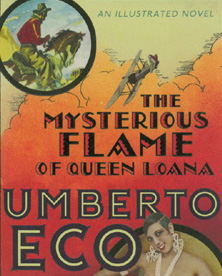Kurt Vonnegut said that there is only one story " man falls in hole, man gets out of hole. At the beginning of Umberto Eco's new novel a man awakes in a fog, in hospital, not knowing his name, or even his own face, let alone his wife or children. This is a fascination hole to watch a man climb out of, and a daring scenario for a novelist to portray convincingly. Does Eco manage to pull it off?
The unfortunate man has memories of general facts, but he lacks memories of anything he had an emotional connection to. The resulting identity crisis precipitates a quest to retrieve his memory and thus reconstitute himself. He is told that he is Giambattista Bodoni, known as Yambo, a sixtyish Milanese antiquarian book dealer, married to Paola, with two daughters; all strangers. He goes "home' and tries to figure out who he is. Paola encourages him to immerse himself in the papers of his past, to perhaps trip some mental switch and bring his memory back.

Yambo goes to his family's country house, and combs old boxes of books and ephemera from his WWII boyhood. Eco includes images of what Yambo finds, and lyrics of songs he replays. Eco is presumably evoking his own experience of pop culture and I suspect this would resonate with Italians far more than it does for an Anglo-Australian like me.
Yet Yambo remains unfulfilled " he relives his generation's experience, not his own. Finding love poems to a beautiful schoolgirl, Lila, Yambo surmises that all his romances have attempted to find this ideal girl in other women, but just as he decides to leave the house a second Incident occurs, leaving Yambo in limbo - disconnected from his body, but connected to his own lost memories of the people and events that make sense of his early life. Here are the most absorbing vignettes in the novel " well-told stories of wartime boyhood and adolescence. Yet Yambo is still confused about who he is " is he merely dreaming within a coma? He decides that if he can recall Lila's face, this will be the proof of her reality and his memories, and will be his health and salvation. Finally, Yambo has what he thinks is a revelatory vision, but seems instead to be a dying hallucination.
What has Eco achieved? Yambo's predicament permits exploration of the question What makes us who we are? Eco proceeds on the premise that our past is the essential anchor for our future; Yambo is told "You can't stretch towards the future because you've lost your past'. However, Eco tells us that it is not enough to understand our times, and the cultural forces that have been at work upon us. Our personal memories are needed, for our life is found in what happened uniquely to us and what we made of it.
Yet is this a satisfying treatment of the questions Eco raises? Yambo's solitary attempt to unlock his childhood memory leaves him disconnected from his significant relationships. But is our childhood memory the best place to discover who we are? Or would Yambo have been better off seeking to discover who he was through relating to the people who loved him in the present?
In my view Eco's novel would be far more interesting if it had examined not only the role of our memory, but also the role of our relationships in forming our identity. The Bible suggests in many ways that our identities arise from our relationships " with God and with each other " not simply from our knowledge of our personal history. The exclusive concern with early memories left me feeling that Eco's consideration of his character's predicament was incomplete. I wished Yambo had returned to Paola and the others in Milan, following his failed quest in the country house, to piece together these relationships. They were significant parts of his history, and not only his history, but also his present and his future.
Perhaps even worse, Yambo becomes focussed upon recovering the memory of Lila's face, as the path to knowledge and salvation. It seems thin to pin such hope upon a memory of ideal beauty. Whether Eco means to suggest that beauty is the proper object of such hopes, or whether Yambo's expectation is meant to seem misconceived is hard to know. If the former, Eco's novel ends up being as shallow as a fashion plate " mere beauty (good as it is) cannot give substance and truth to our lives. If the latter, Eco leaves his protagonist deluded and confused as death overwhelms him. Some homecoming!
Despite some excellent story-telling towards the end, and Eco's usual highly allusive prose and detailed and playful evocation of the novel's cultural world, this novel failed to win me over.



























